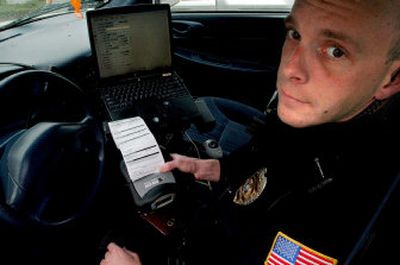E-tickets speed up citation process

Speeding drivers in the River City are getting speedier service.
Post Falls police on Wednesday began an electronic citation program, becoming the first agency in the state to issue e-citations. Tickets can be issued in as little as two minutes using the new technology, compared with 10 to 15 minutes it takes for an officer to pull out a ticket book and write a citation by hand, said Lt. Scot Haug.
“It always is terrible to get a citation,” Haug said. “Now we can get people on their way quicker.”
Three patrol cars are equipped to issue the e-citations through the pilot program, which is partly funded by the Idaho Supreme Court. If the pilot is a success, the department plans to install software and printers in every patrol car, Haug said.
To issue a ticket, an officer scans the barcode on a driver’s license. The reader is connected to mobile computers previously installed in all of the city’s patrol cars. The driver’s information – name, address, date of birth, license number – is automatically transferred to the electronic ticket.
“The officer can finalize the citation with a few keystrokes,” Haug said.
Next, the officer prints a copy of the ticket using a portable printer. “It almost looks like a Wal-Mart receipt,” he said.
A record of the ticket is sent instantly via wireless technology to the police department and the clerk of the First District Court.
The technology eliminates several steps in a lengthy process, Haug said. Once an officer issues a traditional ticket, the police department has to enter all of the information into its computers. Each day, an employee drives to the courthouse in Coeur d’Alene to deliver carbon copies of each citation. Then, the court clerk enters the information into the court’s computers.
With a quarter-million citations issued annually in Idaho, shaving even a few moments off the process could save tons of time, labor and money, Haug said.
Automating the process also could help eliminate mistakes, he said. With handwritten tickets, Haug said there’s a 1 percent to 2 percent error rate. Officers sometimes write in the wrong fine amount, misspell a name or put down the wrong court date. And sometimes a clerk has problems reading an officer’s writing, Haug said.
Post Falls was selected for the pilot program because Chief Cliff Hayes was on a statewide committee that looked into automating tasks. He discussed the possibility of e-citations with a representative from the Idaho Supreme Court.
Because Post Falls already had much of the technology to support the program, as well as computers in every patrol car, Haug said it was a natural fit.
About $20,000 for the project came from the Post Falls police budget, he said. The Supreme Court provided $10,000.